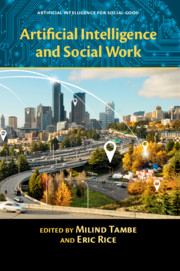
-
Select format
-
- Publisher:
- Cambridge University Press
- Publication date:
- 24 November 2018
- 29 November 2018
- ISBN:
- 9781108669016
- 9781108425995
- 9781108444347
- Dimensions:
- (228 x 152 mm)
- Weight & Pages:
- 0.5kg, 266 Pages
- Dimensions:
- (229 x 152 mm)
- Weight & Pages:
- 0.418kg, 268 Pages
You may already have access via personal or institutional login
Book description
This book marries social work and artificial intelligence to provide an introductory guide for using AI for social good. Following an introductory chapter laying out approaches and ethical principles of using AI for social work interventions, the book describes in detail an intervention to increase the spread of HIV information by using algorithms to determine the key individuals in a social network of homeless youth. Other chapters present interdisciplinary collaborations between AI and social work students, including a chatbot for sexual health information and algorithms to determine who is at higher stress among persons with Type 2 Diabetes. For students, academic researchers, industry leaders, and practitioners, these real-life examples from the USC Center for Artificial Intelligence in Society demonstrate how social work and artificial intelligence can be used in tandem for the greater good.
Reviews
'Tambe and Rice have created a novel collaboration which brings together computer science and social work researchers to address seemingly intractable social challenges. The variety of problems described in the collection on which cross-disciplinary teams have already made progress makes evident the promise of this new type of collaboration. The final chapter’s thoughtful consideration of the ethical issues such work raises is a model for taking ethics into account from the start of designing artificial intelligence systems.'
Barbara Grosz - Harvard University, Massachusetts
'This book frankly acknowledges both striking creative possibility as well striking inequalities, unmet need and devastating consequences in today’s complex society. More than ever we need capacity to think, create, and problem solve in innovative ways: to leverage our technological and social tools toward more nimbly dissipating seemingly intractable social problems. This collection offers a bold vision in this regard, demonstrating what unanticipated partners - social work scientists and computer scientists - can accomplish. It provides valuable guidance highly relevant not only for these two sets of scholars and field partners, but what multiple disciplines and stakeholders can work toward. Rather than remaining in initial levels of aspirational ideas, these authors provide a panoply of concrete, detailed, and accessible innovations that move to operationalize AI for social good. Kudos, colleagues!'
Paula S. Nurius - University of Washington
'The time has come for social work to engage deeply with those from computer science, data science, and engineering to work towards greater social good. This book boldly claims that space. Tambe and Rice bring the power of artificial intelligence to social work in a way that is engaging and easy to understand. Their inclusion of real world examples shows the reader how this can be done. Bravo for helping bridge the gap between these fields in an effort to improve the world.'
Stephanie Cosner Berzin - Simmons University, Massachusetts
Contents
Metrics
Altmetric attention score
Full text views
Full text views help Loading metrics...
Loading metrics...
* Views captured on Cambridge Core between #date#. This data will be updated every 24 hours.
Usage data cannot currently be displayed.
Accessibility standard: Unknown
Why this information is here
This section outlines the accessibility features of this content - including support for screen readers, full keyboard navigation and high-contrast display options. This may not be relevant for you.
Accessibility Information
Accessibility compliance for the PDF of this book is currently unknown and may be updated in the future.


